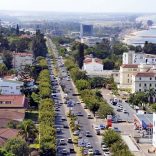Mozambique received 2.9% less in external loans last year, public sector received more than half
Mozambique: Irregularities in the 2016 General State Account

DW / The matter was debated in parliament and divided the house
Mozambican Administrative Court has pointed out several irregularities in the 2016 General State Account, namely divergences between revenue data and tax registers.
Renamo asks: Who pocketed the dividends?
The list of irregularities drawn up by the Administrative Court also remarks on the absence of records of the revenues from dividends actually paid to the state, and points to divergences in tax records, as well as to disbursements and repayments of loans as a result of retroactive agreements.
On the other hand, some major centralised entities did not declare the collection of revenues forecast in the State Budget, while in the extractive industry, recoverable costs reported by large companies involved in gas exploration remain uncertified.
The issue was debated on Wednesday and Thursday of this week in parliament in Maputo, and divided the benches, with the Liberation Front of Mozambique (Frelimo, the ruling party) maintaining that the account accurately mirrored the execution of the 2016 Budget, while the opposition pushed it to be voted down.
Where are the dividends?
The government has stated that a number of measures were being put in place to ensure greater transparency and the strengthening of public management, so for opposition Renamo MP Samo Gudo, in the face of the irregularities pointed up by the Administrative Court, it was only right and proper to ask: “Who kept the dividends, where are they?”
Democratic Movement of Mozambique MP Silvério Ronguane, noting that the report acknowledged that the gross domestic product growth fell to 3.8 percent and average inflation soared to 19.9 percent, said: “Let us vote it down, this can’t be!”
Frelimo stressed that 2016 was an atypical year. “Even so, the Government, by means of efforts, guaranteed all the basic social expenses for the population,” Daniel Teixeira emphasised.
According to the prime minister, Carlos Agostinho do Rosário, “despite this atypical situation our fiscal policy continued to favour the allocation of 60 percent of public spending to priority sectors, including education, health and water supply”.
Still the hidden debts
The opposition insisted that the debate on the 2016 General State Account comes at a time when the country is undergoing a crisis caused by the hidden debts contracted by three companies in 2013 and 2014, with state guarantees but without the knowledge of parliament and of international partners.
They accused the government of negotiating with creditors to restructure debt with promises of payment, based on revenues that will result from gas sales in 2022 and 2023. The opposition said that Mozambicans refuse to pay this debt and demand the disclosure of the audit report on these debts and the accountability of those responsible.
In reply, Economy and Finance Minister Adriano Maleiane defended the dialogue with creditors, arguing that the debt will not disappear until an agreement on the matter was reached.
The country is currently negotiating with the holders of 17 percent of Mozambique’s total debt stock, which “accounts for 41 percent of debt service” Maleiane said. “We are analysing the capacity of the country to serve education, health and all that, and we are saying that it is not possible at this moment to make this payment, so we have to find some other solution,” he said.












Leave a Reply
Be the First to Comment!
You must be logged in to post a comment.
You must be logged in to post a comment.